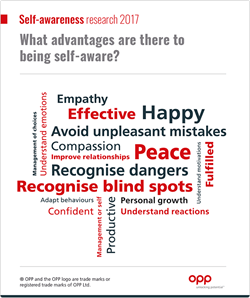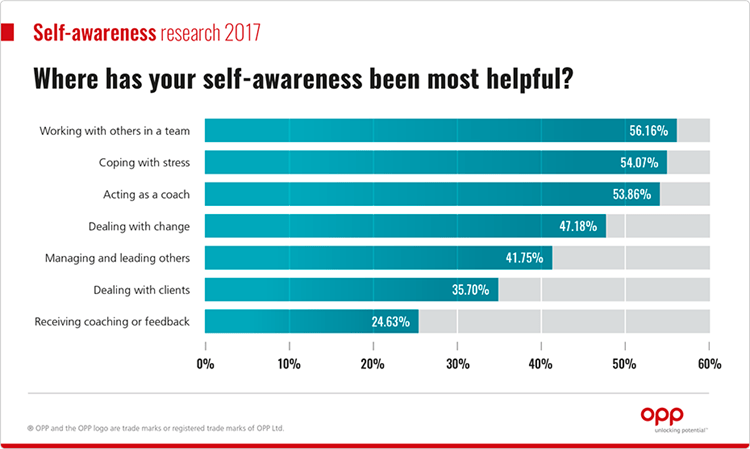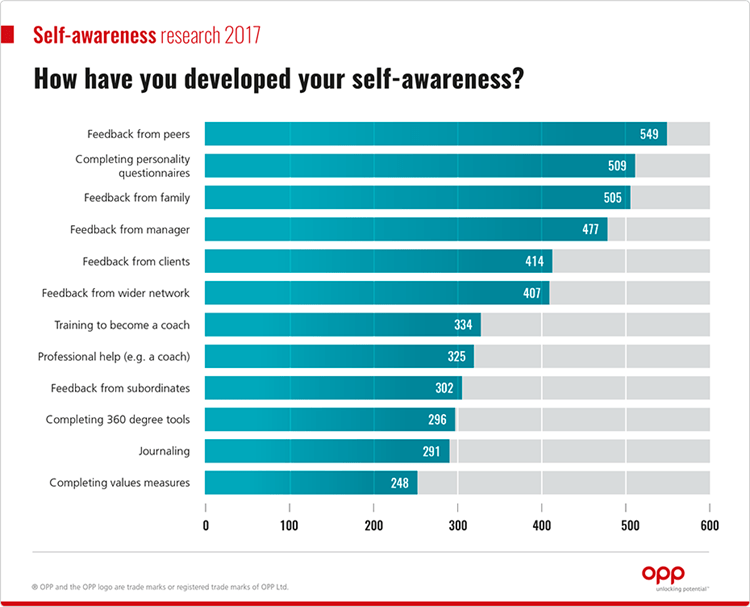Self awareness
Helen Rayner, Lead Consultant, OPP
In the first of our self-awareness series, we’ll share how people benefited from improved self-awareness and how they got there.
Who did we speak to?
The research took place between April and June 2017, and was completed by 937 people. 71% of respondents were female, 27% male, 2% transgender/preferred not to disclose, and the age range was 14 to 90 years with a mean age of 45. Respondents knew their reported MBTI best-fit type, so we might expect a higher level of awareness than across the broader population.
What did we ask?
Our survey included questions such as:
- What are the advantages/disadvantages of being self-aware?
- Where has self-awareness been most useful?
- How has MBTI knowledge informed everyday behaviours?
But first, we asked respondents for their views on self-awareness generally.
 What did people say about self-awareness?
What did people say about self-awareness?
From our questionnaire, 87% of respondents said it was important for them to monitor their mental state. 78% enjoyed exploring their inner self, while 98% said that it was important to understand why people behave the way they do.
What are the advantages of self-awareness?
 The top advantage from our respondents was understanding reactions and motivation. The next three – management of self/others/choices, adapting behaviours and improving relationships – are perhaps more obviously connected with what we do every day in the workplace.
The top advantage from our respondents was understanding reactions and motivation. The next three – management of self/others/choices, adapting behaviours and improving relationships – are perhaps more obviously connected with what we do every day in the workplace.
It’s worth noting that self-awareness can help people to avoid unpleasant/negative experiences or mistakes. Introverts were more likely than Extraverts to use self-awareness to avoid unpleasant situations. And if we look at adapting behaviours – again, crucial for working with different types of people – Sensing types were most likely to flex and adapt their behaviour, according to the situation. But more about MBTI personality type and self-awareness in our next blog.
As a counterpoint, the biggest reported disadvantage of self-awareness was over-thinking or over-analysing.
As well as exploring benefits to individuals, we also asked what people perceived as the benefits to others. Many of the responses included comments about being a ‘better person’ and increased ‘productivity’.
How does self-awareness benefit businesses and organisations?
Since becoming aware of their MBTI type (ie since becoming more self-aware), our respondents said they:
- Make better decisions (61% of respondents said this)
- Are more confident leaders (64%)
- Feel more confident in their contributions at work (67%)
- Capitalise on their strengths more (85%)
They also said that self-awareness had been most helpful in the following areas:
- Dealing with change
- Managing/leading others
- Coping with stress
- Working with others in a team

These findings indicate a strong potential link between self-awareness and workplace performance.
What’s the best way to develop self-awareness?
We asked respondents which methods they used to improve their self-awareness, and which ones worked best.
Feedback from peers came out top, with 86% rating it as effective/very effective. Completing a personality questionnaire was the next most effective (78% said it was effective or very effective), followed by feedback from family (63%).

Summary
These top-level findings from the research show that increased self-awareness has a favourable impact on key work-related areas, such as decision-making, leadership, confidence and capitalising on strengths. We’ll look more closely at the business implications for self-awareness in a future blog post, but the next blog will focus on the individual – we explore self-awareness and MBTI type in more detail.